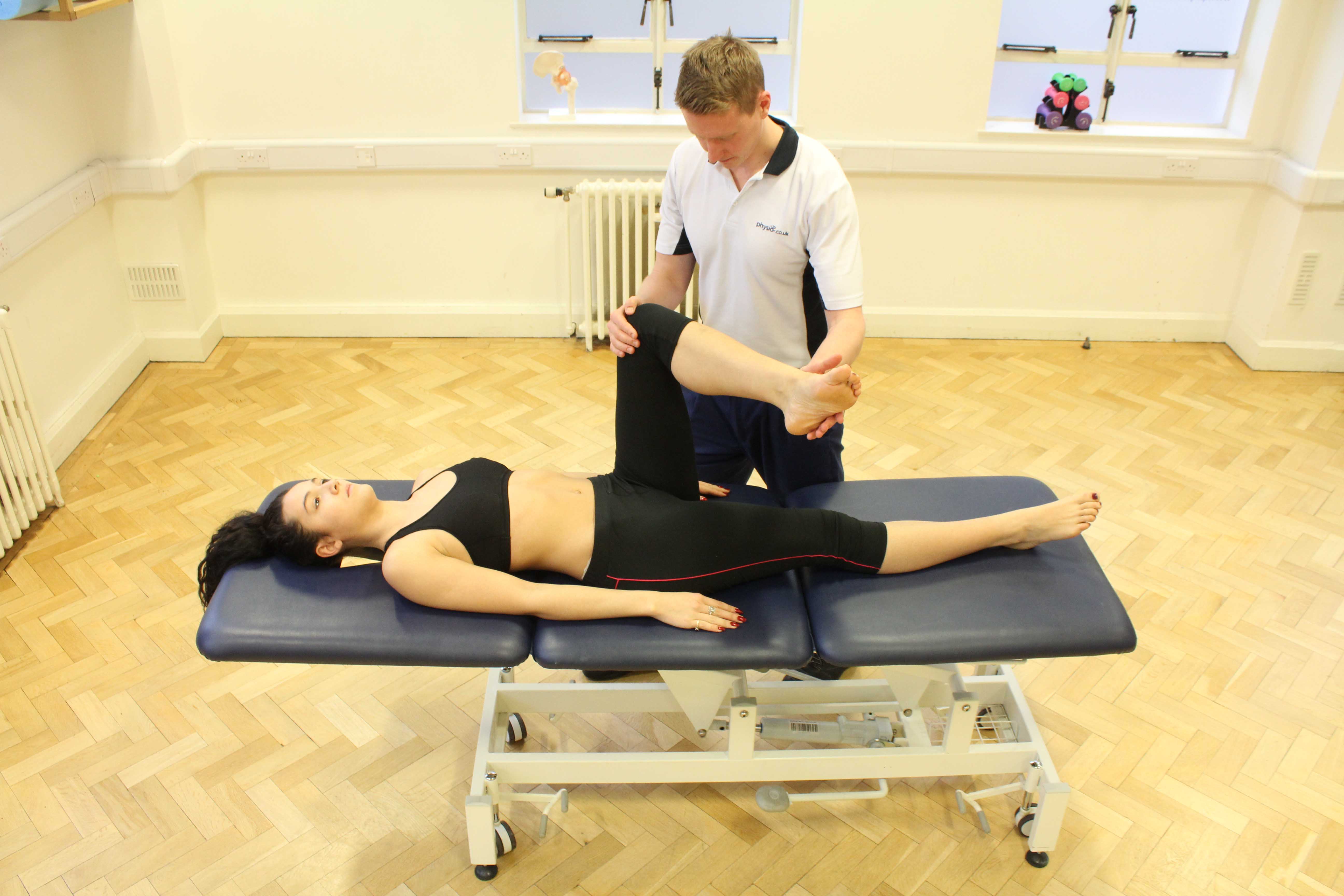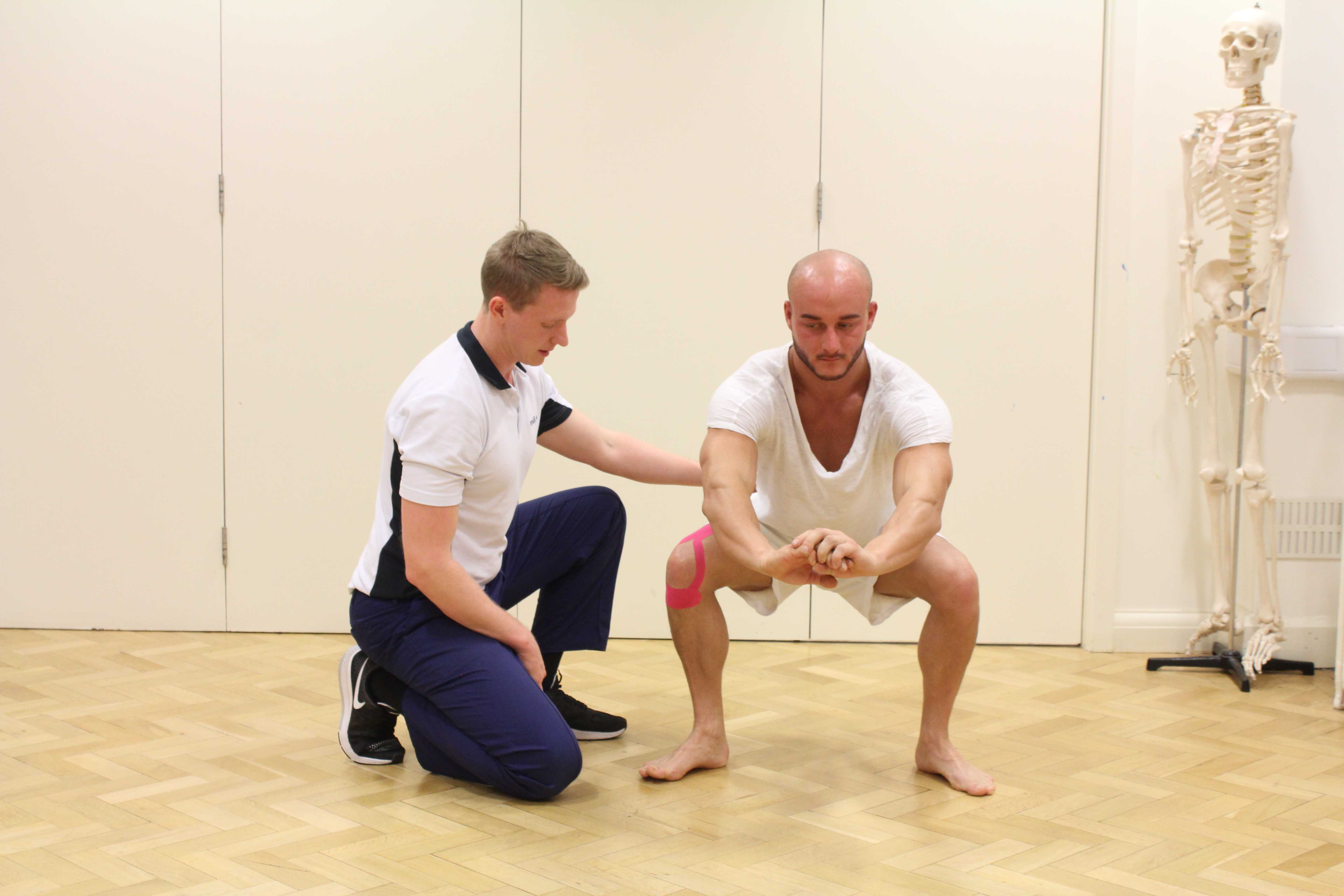Anterior Cruciate Ligament Rupture
An anterior cruciate ligament (ACL) rupture is a severe musculoskeletal injury. It is a relatively common knee injury amongst sports enthusiasts but can affect anybody. If left untreated, other structures within the knee may become damaged therefore, treatment is imperative.
 Above: filetitle1
Above: filetitle1What Is The Anterior Cruciate Ligament?
The anterior cruciate ligament (ACL) is one part of a group of four ligaments within the knee joint.The name cruciate arises from the position of the ligaments forming a cross in shape. The ACL is a stabilising ligament within the knee joint controlling excessive rotation and hyperextension. Our specialist physiotherapists have extensive experience in treating people suffering from ACL ruptures.
What Causes An Anterior Cruciate Ligament Rupture?
There are many causes to an ACL rupture. Most commonly, such injuries are related to high impact sports where the demands to quickly change direction or coming to an abrupt stop are high. Sports such as football, rugby, skiing, tennis and basketball all have high incidence of players suffering from an ACL rupture. However, an ACL rupture can also happen to anyone, young and old suffering from an awkward trip or fall.
Mechanics Of An Anterior Cruciate Ligament Rupture
The ACL runs diagonally in the knee connecting the femur (thigh bone) to the tibia(shin bone). The purpose of the ACL is to prevent the tibia sliding to far forward in relation to the femur. If the tibia is forced to move in front of the femur then the ACL may tear or rupture completely. There are two possible mechanisms of injury, non-contact ACL ruptures and contact ACL ruptures.
Non-contact ACL ruptures occur when a person abruptly stops or changes direction.
Contact-related ACL ruptures usually occur from the knee being forced into hyperextension or when the knee is forced towards the opposite knee. An ACL rupture can also occur following a head on collision in a road traffic accident.
What Are The Symptoms Of An Anterior Cruciate Ligament Rupture?
The symptoms that arise when the ACL is ruptured can include the following:
- Hearing a sudden popping sound
- Swelling
- Instability in the knee
- Pain
- Injured knee giving way when weight bearing
- Locking of the knee during movement
Diagnosis Of An Anterior Cruciate Ligament Rupture
To diagnose an ACL rupture you will be required to give a complete history of how you acquired your injury to your physiotherapist.Combining this with a number of clinical tests, your physiotherapists will be able to confidently diagnose an ACL rupture. The clinical tests used to identify a ruptured ACL include:
- Anterior draw test
- Lachmans test
 Above: filetitle2
Above: filetitle2Medical Treatment Of An ACL Rupture
If you sustain a complete rupture to the ACL then it is highly possible that surgery will be required.The procedure is known as an ACL reconstruction. An ACL reconstruction is carried out under general anaesthetic. The surgeon will assess the knee arthroscopically to examine the injury and to check to see if any other structures are damaged within the knee.The ruptured ACL cannot just be sewn back together, therefore, the surgeon will have to take a graft from the hamstring tendons, commonly the gracilis and semitendinosus tendonsare used or either the patellar tendon. The surgeon will drill a small hole through the femur and tibia and the new tendon is passed through before being firmly attached by special devises to hold the new tendon in place.Discharge is usually the next day following surgery, so rehabilitation can start immediately.
Physiotherapy Following An Anterior Cruciate Ligament Rupture
There are two ways in which a physiotherapist can treat symptoms relating to anterior cruciate ligament ruptures, either conservatively or post operatively.
Conservative treatment - the aim of conservative treatment following an ACL rupture is to restore full movement within the knee whilst making it stable. The focus will be to strengthen the knee and increase the balance awareness around the knee joint so you can return to normal activities. Sometimes despite this the knee can remain unstable and surgery is required.
Post-operative treatment - will follow strict guidelines that your surgeon has put in place for the physiotherapist to follow. The rehabilitation program is specific to you but may include:
- Swelling control
- ROM exercises
- Quadriceps leg control exercises
- Gait re-education
- Strengthening exercises
- Proprioception exercises
- Functional strengthening
- Agility and sports specific drills
- Return to sports
Benefits Of Physiotherapy Treatment
Physiotherapy is crucial in returning you to your normal activities after you have sustained an ACL rupture. It can be a long and difficult process but our specialist physiotherapists have extensive knowledge in ACL rehabilitation and will keep you focused on your treatment plan.The benefits to physiotherapy treatment include:
- Decreasing pain levels
- Decreasing swelling
- Improving ROM and flexibility
- Increasing muscle strength
- Improving balance
- Improving mobility
- Improving stability of knee
- Returning you to sports/activities
How to arrange an appointment
To book an appointment with one of our specialist physiotherapists then you can either email us at office@............. Or call us on…………..
Summary
An ACL rupture can be a very debilitating injury. However, surgery may or may not be required depending on your circumstance. Physiotherapy treatment is imperative following an ACL rupture. Rehabilitation is a long process but physiotherapy will help you get back to your pre injury activities.

 0330 088 7800
0330 088 7800

































